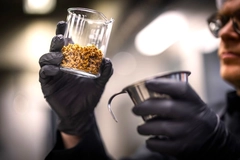
- Industry news
Industry news
- Category news
Category news
- Reports
- Key trends
- Multimedia
- Journal
- Events
- Suppliers
- Home
- Industry news
Industry news
- Category news
Category news
- Reports
- Key trends
- Multimedia
- Events
- Suppliers

Hercules is a leader in specialty additives and ingredients that modify the physical properties of water-based systems and is one of the world’s leading suppliers of specialty chemicals to the pulp and paper industry.
14/07/08 Ashland Inc. and Hercules Inc. have entered into a definitive merger agreement under which Ashland would acquire all of the outstanding shares of Hercules for $18.60 per share in cash and 0.093 of a share of Ashland common stock for each share of Hercules common stock. The total transaction value is approximately $3.3 billion, or $23.01 per Hercules share based on Ashland’s July 10 closing stock price and including $0.7 billion of net assumed debt. The transaction, which would create a major, global specialty chemicals company, is expected to close by the end of calendar 2008.

With sales in more than 100 countries, Ashland is a manufacturer of specialty chemicals, a leading distributor of chemicals and plastics, and a provider of automotive lubricants, car-care products and quick-lube services. Hercules is a leader in specialty additives and ingredients that modify the physical properties of water-based systems and is one of the world’s leading suppliers of specialty chemicals to the pulp and paper industry. Hercules' Aqualon Division produces a wide range of cellulose ethers (CMC, MC and HPMC) for food, pharma and industrial applications.
Upon the transaction’s close, Ashland will have pro forma combined revenue for the 12 months ended March 31, 2008, of more than $10 billion, including approximately $3.5 billion generated outside North America. For the same period, Ashland generated earnings before interest, taxes, depreciation and amortization (EBITDA) of $365 million excluding certain items, while Hercules reported ongoing EBITDA of $392 million excluding certain items. Specialty chemicals, which on a pro forma basis represents approximately 75 percent of total EBITDA, will serve as Ashland’s primary platform for future growth.
Ashland Chairman and Chief Executive Officer James J. O’Brien said, “The acquisition of Hercules fulfills our objective to become a leading specialty chemicals company. It creates a defined core for Ashland composed of three specialty chemical businesses with strong market positions and promising global growth potential: specialty additives and ingredients, paper and water technologies, and specialty resins. In addition, we expect our financial profile to be enhanced significantly through reduced earnings volatility, improved profitability and stronger cash flow generation.”
In specialty additives and ingredients, Hercules’ Aqualon business is one of the most recognized and admired specialty chemical brands in the world and brings Ashland a significant market position in rheology modifiers, which alter the physical properties of water-based systems. These additives are used across a wide range of industries to make everything from adhesives and paints to foods, pharmaceuticals and personal care products. Nearly all of Aqualon’s additive products are water soluble polymers derived from renewable materials. The combined company generates, on a pro forma basis, approximately one-third of EBITDA from bio-based or renewable chemistries.
“We will combine the paper and water businesses of each company to create one global paper and water technologies business with annual revenue of $2 billion,” said O’Brien. “In particular, Hercules’ leadership position in pulp and paper technologies bolsters our participation in one of the world’s largest water treatment markets. The combined businesses will provide the scale to leverage opportunities in other key water treatment markets including municipal, industrial and marine.
“The third business within our new core – specialty resins – is one where Ashland has long enjoyed a strong reputation for innovation and service. A broader international footprint will offer the specialty resins business expanded global growth opportunities in key building and construction markets, including infrastructure and wind energy. In addition, our Distribution and Valvoline businesses provide complementary capabilities and share similar markets with the specialty chemical businesses,” said O’Brien.
Ashland expects to realize annualized run-rate cost savings of at least $50 million by the third year following the transaction’s close by eliminating redundancies and capturing operational efficiencies. In the first year following the transaction’s close, while the combination is modestly dilutive to earnings per share on a reported basis, it is expected to be significantly accretive to Ashland’s earnings per share excluding merger costs and noncash depreciation and amortization charges resulting from the transaction.











